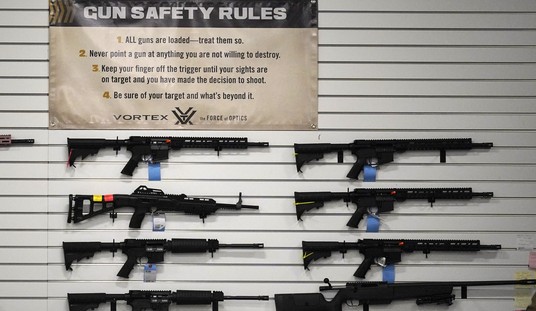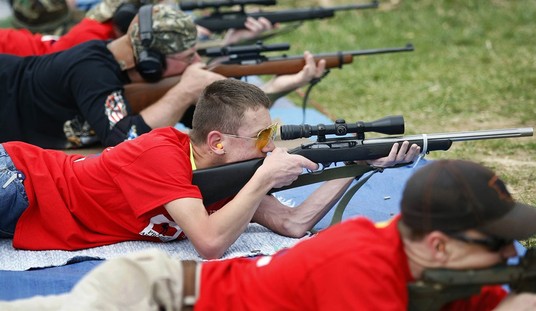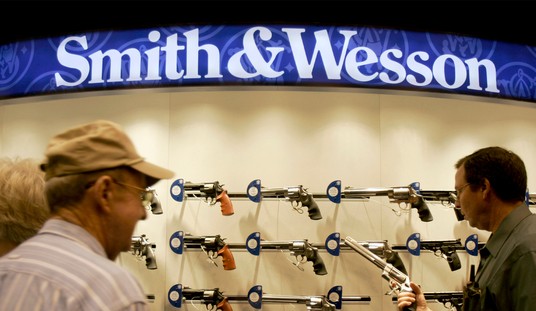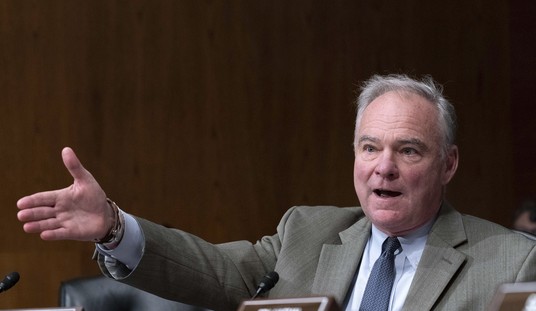Gun control extremist Adam Winkler, a constitutional law professor at UCLA, is having a hissy fit over mild statements made by Supreme Court Justice Antonin Scalia regarding his interpretation of the Second Amendment:
Scalia answered some questions written by the audience, including a hot-button issue in Montana: the Second Amendment’s right to keep and bear arms.
“What remains to be determined … appears to be the scope of the armament that people can keep and bear,” he said. “Can they bear shoulder-fired rocket launchers?”
He said the court will have to take those cases as they come, but his approach will be to apply the historical understanding of the Second Amendment, which was not just in self-defense against animals and home intruders, but for the people to protect themselves against a tyrannical leader.
Scalia’s comments that they will have to take the cases as they come, instead of giving a blanket denunciation of the scope of arms citizens may own, was enough to give delicate Professor Winkler a near heart attack:
Five years ago, in a case called District of Columbia v. Heller, Justice Scalia, writing for the majority, said that the core of the Second Amendment was personal self-defense. The arms protected, he wrote, were those that are in common use for lawful purposes, like handguns. Perhaps four-and-a-half years of living under President Barak Obama—you know, that socialist from Africa who’s bent on destroying America—has convinced Scalia that Americans need a right to far more powerful weapons. If the Second Amendment guarantees a right to revolt against the government, then surely Scalia’s question about shoulder-fired rocket launchers isn’t so hypothetical. Americans would need such rocket-launchers—along with fully-automatic machine guns—to have any reasonable chance of success against the military’s weapons. Handguns aren’t going to cut it against Obama’s drones, stealth fighters, and other high-tech, high-powered weapons.
The idea that the Second Amendment gives people the right to revolt against government is broadly shared among gun-rights extremists. And, indeed, the Framers were armed revolutionaries who understood that guns were useful for throwing off the yoke of tyranny. No doubt they believed that an armed citizenry would make it difficult for a tyrannical ruler to run roughshod over the people. But that’s not why they put the Second Amendment in the Constitution.
Those Americans who have actually read the many comments made by the Founders regarding the purpose of the Second Amendment—and understood them—don’t find Scalia’s understanding of the intent of the right to bear arms “extreme” in the slightest. After all, the Founders were very clear on what they meant.
Tenche Cox, Pennsylvania delegate to the Continental Congress, thrice explained the purpose of the Second Amendment to his fellow citizens. The first time was in The Pennsylvania Gazette, on Feb. 20, 1788.
The militia of these free commonwealths, entitled and accustomed to their arms, when compared with any possible army, must be tremendous and irresistible. Who are the militia? Are they not ourselves? Is it feared, then, that we shall turn our arms each man against his own bosom. Congress have no power to disarm the militia. Their swords, and every other terrible implement of the soldier, are the birth-right of an American … the unlimited power of the sword is not in the hands of either the federal or state governments, but, where I trust in God it will ever remain, in the hands of the people
“Their swords, and every other terrible implement of the soldier, are the birthright of an American.” Is it possible for Coxe to have been more explicit?
The militia are the people. They are not the National Guard (formed more than a century later due to the Militia Act of 1903), which is part of the permanent military that the Founders never wanted.
Coxe wrote again to more explicitly highlight why Americans should have military arms as protection against government in “Remarks On The First Part Of The Amendments To The Federal Constitution,” in the Philadelphia Federal Gazette, June 18, 1789.
As civil rulers, not having their duty to the people duly before them, may attempt to tyrannize, and as the military forces which must be occasionally raised to defend our country, might pervert their power to the injury of their fellow-citizens, the people are confirmed by the next article in their right to keep and bear their private arms.
Again, Coxe was referring to the right of the citizenry to have military-grade small arms to defend itself against the tyranny of government.
Ten years, Coxe wrote again about the importance of arms agains tyranny in the Philadelphia Aurora, as tensions arose between Federalists and Republicans:
Do you wish to preserve your rights? Arm yourselves. Do you desire to secure your dwellings? Arm yourselves. Do you wish your wives and daughters protected? Arm yourselves. Do you wish to be defended against assassins or the Bully Rocks of faction? Arm yourselves. Do you desire to assemble in security to consult for your own good or the good of your country? Arm yourselves. To arms, to arms, and you may then sit down contented, each man under his own vine and his own fig-tree and have no one to make him afraid….If you are desirous to counteract a design pregnant with misery and ruin, then arm yourselves; for in a firm, imposing and dignified attitude, will consist your own security and that of your families. To arms, then to arms.
Coxe would have strongly agreed with a modern restatement of his principles.
An armed man is a citizen. A man without arms is a subject.
Thomas Jefferson, principle author of the Declaration of Independence and third President of the United States, was no less explicit. Mr. Jefferson was strongly in favor of citizens being armed at all times, as noted in a letter to Peter Carr in 1785:
A strong body makes the mind strong. As to the species of exercises, I advise the gun. While this gives moderate exercise to the body, it gives boldness, enterprise, and independence to the mind. Games played with the ball, and others of that nature, are too violent for the body and stamp no character on the mind. Let your gun therefore be the constant companion of your walks.
In a letter to James Madison, on Dec. 20, 1787, Jefferson said:
What country can preserve its liberties if their rulers are not warned from time to time that their people preserve the spirit of resistance. Let them take arms.
It bearing noting that Jefferson was one of the first documented purchasers of what today’s illiberal Liberals would call “assault weapons.” Jefferson purchased two state-of-the-art Giradoni air rifles for Lewis and Clark’s expedition.
Designed circa 1789 and used by the Austrian military to deadly effect, the Giradoni carried one round in the chamber and 21 in an on-board magazine that could be rapidly reloaded from ammo tubes carried on the soldier’s belt. Using compressed air from a cylinder that made up the buttstock, the Giradoni could fire 22 rounds in a minute, as fast as aimed fire from today’s semi-automatic rifles, with virtually no noise. They can be fired without hearing protection, much like today’s prohibitively-regulated suppressed rifles, with head shot-accuracy out to 60 yards and lethality out to 100 yards, better than most of the muskets of their day.
Jefferson authored a far more famous statement about the role of the force of arms in the hands of the citizenry, one that probably terrorizes Professor Winkler’s nightmares.
And what country can preserve its liberties, if its rulers are not warned from time to time that this people preserve the spirit of resistance? Let them take arms…. The tree of liberty must be refreshed from time to time, with the blood of patriots and tyrants.
Jefferson, himself a President, was a profound student of history and the human condition. He recognized that the citizenry must one day find itself at war against its government.
What of the other Founders, may you ask?
They must also be “extremists” in Winkler’s view.
“A free people ought…to be armed….” (George Washington, speech of January 7, 1790 in the Boston Independent Chronicle, January 14, 1790)
“The thoughtful reader may wonder, why wasn’t Jefferson’s proposal of ‘No freeman shall ever be debarred the use of arms’ adopted by the Virginia legislature? They that can give up essential liberty to obtain a little temporary safety deserve neither liberty nor safety.” (Benjamin Franklin, Historical Review of Pennsylvania, 1759.)
“The Constitution shall never be construed…to prevent the people of the United States who are peaceable citizens from keeping their own arms.” (Samuel Adams, Debates and Proceedings in the Convention of the Commonwealth of Massachusetts, 86-87)
“If ever time should come, when vain and aspiring men shall possess the highest seats in Government, our country will stand in need of its experienced patriots to prevent its ruin.” (Samuel Adams, 1780)
“The whole of the Bill (of Rights) is a declaration of the right of the people at large or considered as individuals…. It establishes some rights of the individual as unalienable and which consequently, no majority has a right to deprive them of.” (Albert Gallatin at the New York Historical Society, October 7, 1789)
“…but if circumstances should at any time oblige the government to form an army of any magnitude, that army can never be formidable to the liberties of the people, while there is a large body of citizens, little if at all inferior to them in discipline and use of arms, who stand ready to defend their rights….” (Alexander Hamilton speaking of standing armies in The Federalist. 29)
“What plan for the regulation of the militia may be pursued by the national government is impossible to be foreseen…The project of disciplining all the militia of the United States is as futile as it would be injurious if it were capable of being carried into execution… Little more can reasonably be aimed at with the respect to the people at large than to have them properly armed and equipped ; and in order to see that this be not neglected, it will be necessary to assemble them once or twice in the course of a year.” (Alexander Hamilton The Federalist, No. 29)
“If the representatives of the people betray their constituents, there is then no recourse left but in the exertion of that original right of self-defense….” Alexander Hamilton, Federalist Papers, No. 28)
Any contextual study of the Second Amendment and the men who authored it may only come to one rational conclusion: the Founding Fathers of these United States meant for citizens to be armed with small arms of military utility, without technological limitations.
These men knew war.
They saw and understood technological advances would take place, having personally witnessed huge leaps in firepower from the musket (3-4 shots/minute), to the Ferguson Rifle (10-12 shots/minute), to the Giradoni air rifle (22 “suppressed” shots/minute), just over the course of the American Revolution.
The knew hand grenades and daggers, swords and pivot guns, and desired for each of us to be armed with “every terrible implement of war.”
Today, that would clearly mean selective fire assault rifles and machine guns, and would quite probably mean include RPGs as well as weapons of the individual solider.
The Founders held that the Right of Revolution was our birth right as part of the human condition, and knew military arms in the hands of the citizenry was the only way to maintain our liberties against the always corrupting power of government.
The Second Amendment was never about hunting, Mr. Winkler, nor even individual self defense.
Those “extremists” who created the foundations of this great Republic knew well the threat of tyrants, and they meant us to remain armed against them.
“What, Sir, is the use of a militia? It is to prevent the establishment of a standing army, the bane of liberty…. Whenever Governments mean to invade the rights and liberties of the people, they always attempt to destroy the militia, in order to raise an army upon their ruins.” (Rep. Elbridge Gerry of Massachusetts, spoken during floor debate over the Second Amendment [I Annals of Congress at 750, August 17, 1789])
He was speaking about you, Professor.










Join the conversation as a VIP Member